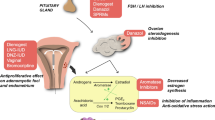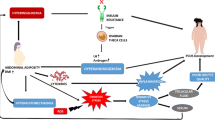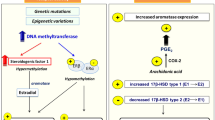Abstract
Intramuscular 17 α-hydroxyprogesterone caproate (Makena®), a synthetic progestin, is indicated to reduce the risk of preterm birth in women with a singleton pregnancy who have a history of a singleton spontaneous preterm birth. Makena® reduces the risk of preterm birth in this patient population, and is associated with improvements in certain fetal/neonatal outcomes. The use of this US FDA-approved formulation of 17 α-hydroxyprogesterone caproate reduces the inherent risks associated with the use of pharmacy-compounded formulations of the drug.

Similar content being viewed by others
References
Deeks ED. 17 α-hydroxyprogesterone caproate (Makena™): in the prevention of preterm birth. Pediatr Drugs. 2011;13(5):337–45.
Meis PJ, Klebanoff M, Thom E, et al. Prevention of recurrent preterm delivery by 17 alpha-hydroxyprogesterone caproate. N Engl J Med. 2003;348(24):2379–85.
Cohen AW, Copel JA, Macones GA, et al. Unjustified increase in cost of care resulting from U.S. Food and Drug Administration approval of Makena (17alpha-hydroxyprogesterone caproate). Obstet Gynecol. 2011;117(6):1408–12.
Makena® (hydroxyprogesterone caproate injection) for intramuscular use: US prescribing information. St. Louis: Ther-Rx Corporation; 2011.
Spong CY, Meis PJ, Thom EA, et al. Progesterone for prevention of recurrent preterm birth: impact of gestational age at previous delivery. Am J Obstet Gynecol. 2005;19(3 Pt 2):1127–31.
Meis PJ, Klebanoff M, Dombrowski MP, et al. Does progesterone treatment influence risk factors for recurrent preterm delivery? Obstet Gynecol. 2005;106(3):557–61.
Rebarber A, Istwan NB, Russo-Stieglitz K, et al. Increased incidence of gestational diabetes in women receiving prophylactic 17alpha-hydroxyprogesterone caproate for prevention of recurrent preterm delivery. Diabetes Care. 2007;30(9):2277–80.
Northen AT, Norman GS, Anderson K, et al. Follow-up of children exposed in utero to 17 alpha-hydroxyprogesterone caproate compared with placebo. Obstet Gynecol. 2007;110(4):865–72.
Sellers S, Utian WH. Pharmacy compounding primer for physicians: prescriber beware. Drugs. 2012;72(16):2043–50.
US Department of Health and Human Services. US Food and Drug Administration. The special risks of pharmacy compounding. 2012. http://www.fda.gov/ForConsumers/ConsumerUpdates/ucm107836.htm. Accessed 8 Jan 2013.
US Department of Health and Human Services. US Food and Drug Administration. Questions and answers on updated FDA statement on compounded versions of hydroxyprogesterone caproate (the active ingredient in Makena). 2012. http://www.fda.gov/newsevents/newsroom/pressannouncements/ucm310215.htm. Accessed 8 Jan 2013.
Chollet JL, Jozwiakowski MJ. Quality investigation of hydroxyprogesterone caproate active pharmaceutical ingredient and injection. Drug Dev Ind Pharm. 2012;38(5):540–9.
Society for Maternal-Fatal Medicine Publications Committee. Progesterone and preterm birth prevention: translating clinical trials data into clinical practice. Am J Obstet Gynecol. 2012;206(5):376–86.
ClinicalTrials.gov. http://www.clinicaltrials.gov/ct2/results?term=makena. Accesssed 8 Jan 2013.
Disclosure
This article was updated from Pediatric Drugs 2011;13(5):337–45 [1]. The preparation of this review was not supported by any external funding. During the peer review process, the manufacturer of the agent under review was offered an opportunity to comment on the article. Changes resulting from comments received were made by the authors on the basis of scientific and editorial merit.
Author information
Authors and Affiliations
Corresponding author
Additional information
The manuscript was reviewed by: D.J. Dudley, Department of Obstetrics and Gynecology, University of Texas Health Sciences Center at San Antonio, San Antonio, TX, USA
Rights and permissions
About this article
Cite this article
Hines, M., Lyseng-Williamson, K.A. & Deeks, E.D. 17 α-Hydroxyprogesterone Caproate (Makena®). Clin Drug Investig 33, 223–227 (2013). https://doi.org/10.1007/s40261-013-0060-6
Published:
Issue Date:
DOI: https://doi.org/10.1007/s40261-013-0060-6




